The 3rd annual Facilitator Summit
We hosted our annual facilitator summit last week alongside our sponsor MURAL, but this time, it was virtual. Instead of gathering in Austin’s Capital Factory, 172 eager learners, expert facilitators, and meeting practitioners gathered online for a 3-day interactive workshop. Our mission each year at Control the Room is to share a global perspective of facilitators from different methodologies, backgrounds, races, genders, sexual orientations, cultures, and ages. We gather to network, learn from one another, and build our facilitation toolkits.
This year’s summit theme was CONNECTION. Human connection is an integral component of the work we do as facilitators.
When we connect things become possible. When we are disconnected there is dysfunction. When ideas connect they become solutions. When movements connect they become revolutions.
Control the Room is a safe space to build and celebrate a community of practice for facilitators, which is paramount to learn, grow, and advance as practitioners and engaging in a dialogue that advances the practice of facilitation. We must learn the tools and modalities needed to foster connection and be successful facilitators in the new virtual landscape.
“We must establish a personal connection with each other. Connection before content. Without relatedness, no work can occur.” —Peter Block
This year’s summit consisted of 18 expert facilitator guest speakers who presented lightning talks and in-depth workshops, where they shared their methods and activities for effective virtual facilitation.
Read on for summaries of this year’s Control the Room Summit presentations. Each speaker delivered a 20-minute lightning session in the morning of their following 90-minute facilitated session that afternoon.
Tuesday, February 2, 2021
Voltage Control founder Douglas Ferguson started the summit with an introduction to the importance of connection in the virtual landscape and the critical role facilitators play in it.
He encouraged the group to not only soak in all of the great information provided by the guest speakers but to network with guest attendees and experts alike to gain as much perspective as possible.
The first round of lightning talks and workshops consisted of Van Lai-DuMone, Mohamed Ali, Leslie Forman, Michael Wilkinson, Emily Bowen, and Erik Skogsberg.

Van Lai-DuMone
Incorporate Creativity Into Your Virtual Facilitations
Van Lai-DuMone, the founder of Worksmart Advantage, discussed incorporating creativity into virtual facilitations. Creativity allows facilitators to make people feel heard, that their ideas matter, to express themselves, and to feel connected. Van’s workshop was focused on how incorporating creative tools can not only serve to harness the attention of the group but also serve as a practical tool for: Team Building and Development, Collaboration, Idea Generation, Problem Solving and Trust Building.
“Creativity allows you to make people feel heard.”

Mohamed Ali
You’re That Audience
Mohamed Ali, Service Designer and Facilitator at Independant, discussed how self-interest can create engagement and participation for your audience. Mohamed taught workshop attendees how to prepare an audience for a workshop, long before they show up. The questions attendees answered together were, “how might we effectively onboard participants without overwhelming them with the exercises and time needed to conduct the workshop? How might a beginners’ mindset assist an audience to contribute what they really wish to?”
“Self-interest for an audience is beneficial; engage your audience as much as possible.”


Leslie Forman
Secrets, Constraints, and Emojis
Leslie Forman, Senior User Experience Researcher at Linkedin, spoke about secrets, constraints, and emojis. By implementing the 3 Cs (concrete, colorful, and constrained) we can produce the best results from our team. Leslie discussed practical techniques that facilitators can use to guide participants into deeper discussions, especially about ambiguous or sensitive topics.


Michael Wilkinson
Consensus Building: Techniques for Getting to Yes
Michael Wilkinson, CEO and Managing Director of Leadership Strategies presented techniques to getting to “Yes” in a disagreement; understanding the issue is key to coming to a solution. According to Michael, three reasons people disagree are due to information, different experiences/values, and outside factors. Exploring the type of disagreement – information, different experiences/values, outside factors – and asking questions are instruments to solving the disagreement. In his workshop, Michael equipped attendees with a clear understanding of the three reasons people disagree, three methods for establishing a consensus-focused process, and five techniques for getting to “yes” when disagreements occur.


Emily Bowen
Peace, Love & Understanding
Emily Bowen, Holistic Leadership Consultant and Educator at The Peace Nerd, discussed how to facilitate using peace, love, and understanding. By remaining present and in the moment, facilitators can engage best with their users. Emily showed workshop attendees how to create lightness and ease when facilitators want to connect people to each other and build trust when working remotely.
“Take a moment to breathe and be in this space.”


Erik Skogsberg
Learn to Transform
The last lightning speaker of the day was Voltage Control’s own Erik Skogsberg speaking on how the best learning experiences are learner-focused. Erik informed the group that the best facilitators, whether they know it or not, are Learning Experience Designers (LXDs). LXDs bring the best of user experience design and the learning sciences to bear on creating transformation: whether in a meeting, presentation, workshop, or course. Participants were guided through some hands-on practice in these methods for use in a meeting, workshop, or training of their own and then were introduced to how to design for better learning experiences and lasting change in their future facilitation work.
“It is up to the facilitator to move and adjust to the learners in the room.”


Day one ended with special prize giveaways and a virtual happy hour with all participants.

Wednesday, February 3, 2021
After an introduction to open up the day, the second round of lightning talks and workshops consisted of Jennifer Marin Jericho, Kaleem Clarkson, Caitlin Loos, William Aal, Solomon Masala, Alison Coward.

Jennifer Marin Jericho
How to Pivot When Things Go Wrong
Jennifer Marin Jericho, Co-Founder and Design and Communication Strategist of Jericho Vinegar Works, presented tactics for Effective Facilitation and Facilitation Pitfalls on some of the tips she has learned along the way for when things don’t go the way you expect. We often think of facilitation as the moment when we are in the room, Jennifer said, running a workshop or meeting, but there’s quite a lot of work to be done before and after to host a successful workshop.
“The devil is in the details.”
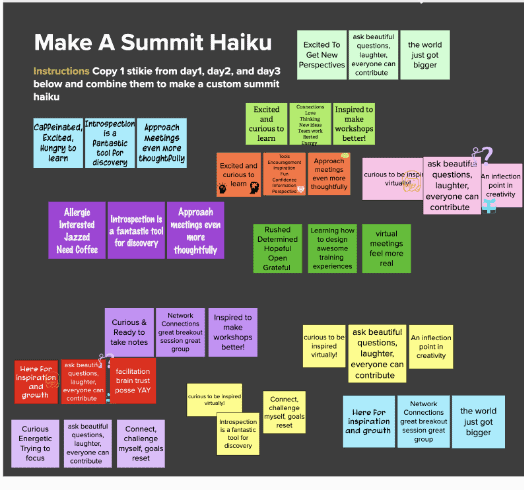
Kaleem Clarkson & David Klasko
Fighting Isolation and Building Meaningful Relationships through the Power of Play
Kaleem Clarkson, Chief Operating Officer at Blend Me, Inc., and David Klasko, Actor, Comedian, and Founder of Artly Working, presented on what the research says about the dangers of isolation, and how playing simple (and incredibly fun) games can create meaningful human connection in the virtual workplace. Technology has provided a platform to find and foster these relationships, but it takes a thoughtful and structured approach to create a human connection. Based on improv comedy, and built for video conferencing, Artly Working has designed workshops to add humor, vulnerability, and spontaneity to the virtual world – in other words, the human element! Using games and exercises developed specifically for the platform, the goal is to fight isolation and loneliness and build bonds on our remote platforms, and not in spite of them. Participants learned games and exercises that can be implemented with teams right away.

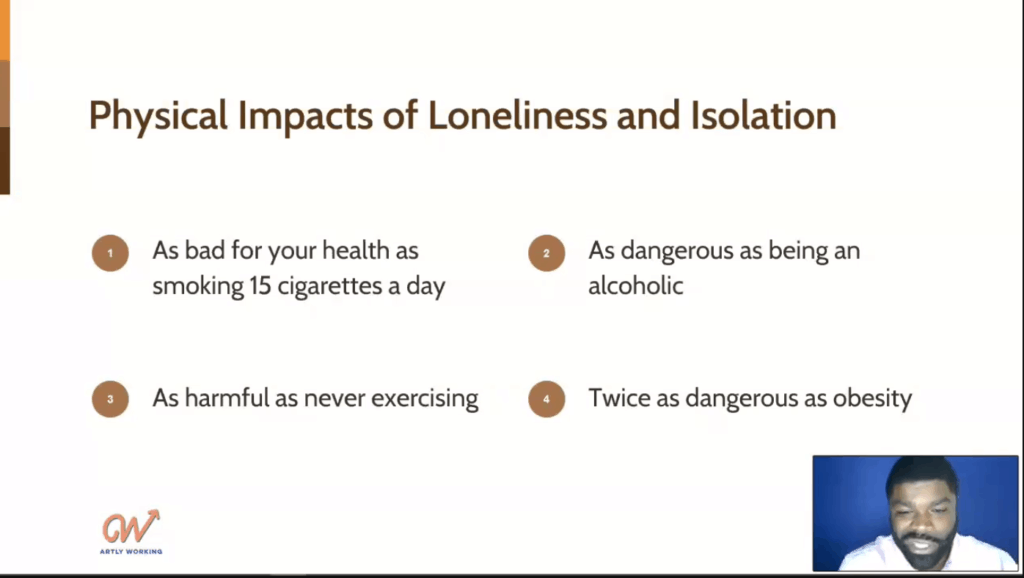
Caitlin Loos & Jordan Hirsch
7 Hours on Zoom…In a good way!
Caitlin Loos, Director of Creative Services at Phase2 Technology, and Jordan Hirsch, Director of Innovation at Phase2, taught participants how they created a 7-hour zoom conference that was energizing, inspiring, & fun. The workshop explored how they turned their annual company conference — a deeply human, connected experience for 100+ people — into a Zoom call that lasted seven hours and spanned four time zones, but still worked. The group experimented and played with activities that helped turn a virtual event into a virtual experience.
“Embracing virtual events should engage all of the senses, incorporate the home, and recognize that virtual is not always better, worse, or the same.” – Caitlin Loos


William Aal
Equity, Power and Conflict in Meeting Design
William Aal, Co-founder and Managing Partner of unConference.net, explored how to disrupt patterns of privilege and oppression that are often overlooked in meeting design in his lightning talk and workshop
“Explore those dynamics in your facilitation practice. Have fun making the invisible visible!”
In his workshop, participants learned how to set the table for people to fully participate, taking into account the currents of power difference in the space. They also learned how to be aware of their own privilege dynamics; how to acknowledge conflict and use it as a tool to deepen community and when process becomes liberatory and when it furthers patterns of oppression.

Solomon Masala
Zip in your Zoom
Solomon Masala, creator of the Source Consultng Group, reminded participants that most humans have been conditioned to get in front of a screen and go passive. He said we forget that real learning is an active, full-body experience, and in our virtual learning world it’s critical to keep the learning juices activated. In his workshop, Solomon engaged participants in 25+ kinesthetic activities that range from 1 minute to 1 hour, guaranteed to get participants energized and enlivened, regardless of the group.

Alison Coward
Workshop Culture for a Better Workplace
Alison Coward, Founder of Bracket, closed out the day by discussing the lasting impacts of workshops. Her presentation explored the real potential of workshops in improving our experience of work, and what else that may bring. Integrating workshop culture into an environment allows for the intended products of workshops like engagement and progress as well as the unintended possibilities such as open communication and more trust.
“Workshops bring many of the factors that we want to see in productive, engaged and positive cultures – collaboration, inclusion, motivation, creativity – so how can we take these elements beyond a one-off event and bring them more generally into the workplace?”


Day two ended with prize giveaways and a happy hour with the summit’s participants.

Thursday, February 4, 2021
Summit participants were welcomed with a warm introduction to the final day, followed by lightning talks and workshops from Madelon Guinazzo, Vinay Kumar, J. Elise Keith, Joshua Davies, Elena Astilleros, and Rachel Ben Hamou.

Madelon Guinazzo
Facilitating Fearlessly with Heart
Madelon Guinazzo, Co-Founder of Cuddlist, addressed that all facilitators have fears, and participants all come with their own fears as well. Her experiential-based workshop explored some common facilitator fears in a safe way. Participants built resilience and the sense of connection that leads to grounded positive action in the midst of fear. Madelon showed attendees how to tap into the powerful potential of transformation that fear holds for both the facilitator and participant. She demonstrated how to let those fear fuel participants into fun and greater trust in themselves and life, and challenged them to explore how to hold fear – their own and others – with equanimity.
“Let your fear out. Exaggerate it. Give it a voice.”


Vinay Kumar
Connecting People and Thinking for Shared Values
Vinay Kumar, Director of Client Engagement at C2C Organizational Development, discussed engagement and creating meaningful connections. In this new age of digital engagement and connection, accessing ways of creating that safe and brave space allows our users to form those bonds and further goals. Using the right brain is not only fun but also helps in drawing out many aspects that participants often find difficult to articulate in a group setting. This is especially true when groups are extremely diverse in terms of experience, cultures, hierarchy, language, etc. Vinay’s workshop explored two methods in creating strong connections that increase the effectiveness of group work.


J. Elise Keith
Facilitating in Real Time, Near Time, and Far Time
J. Elise Keith, Founder and CEO of Lucid Meetings, spoke about facilitating in the present, near, and future. We can take a project from real-time excitement to near and far-time enthusiasm through creating records and remembrances of the occurrence. In her workshop, J. Elise explained that professional facilitators are pretty skilled at planning and running events. But the challenge is how to make sure that the work in facilitated events and the changes these events inspire have an impact on the everyday lives of those being served. Participants explored what it means to facilitate across different time scales and surface ideas we can all use to make a more lasting impact.
“Traditional skills are being replaced.”
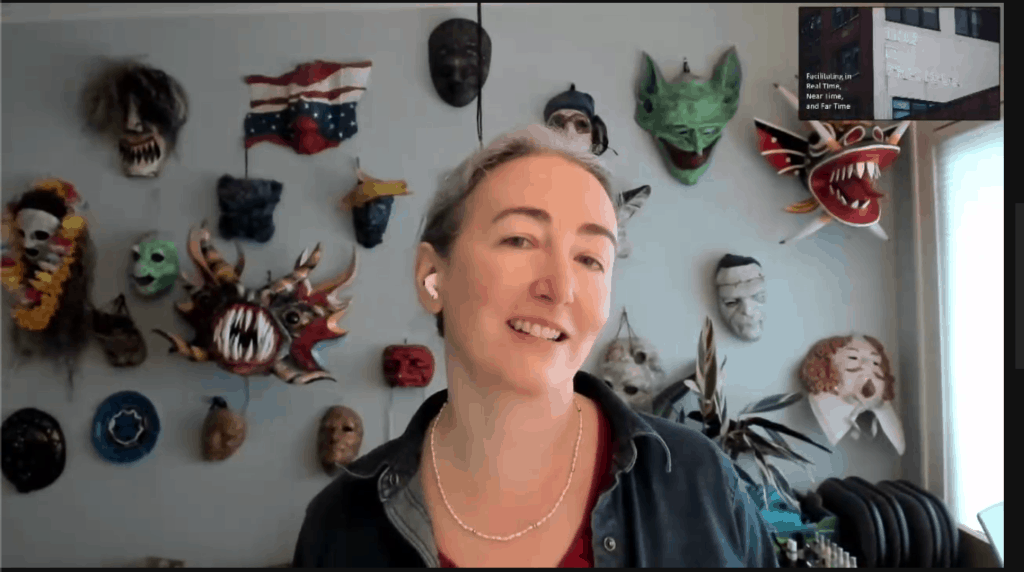

Joshua Davies
Moving Minds: Exploring Conversation Maps in Facilitation
Joshua Davies, Founder and Lead Conversation Architect at Knowmium, examined how conversations operate and move in our facilitations. If we are to reach an understanding with others, we must have a path to empathy. Too many conversations are treadmills, endless, going without ever getting anywhere, or broken parallel monologues in search of true dialogue. In his session, participants explored practical techniques for better awareness and co-creation in discussions using conversation mapping, contrasting, and cadence control.
Types of conversations: understanding, problem-solving & exploring, blocking/telling, storytelling/persuading.

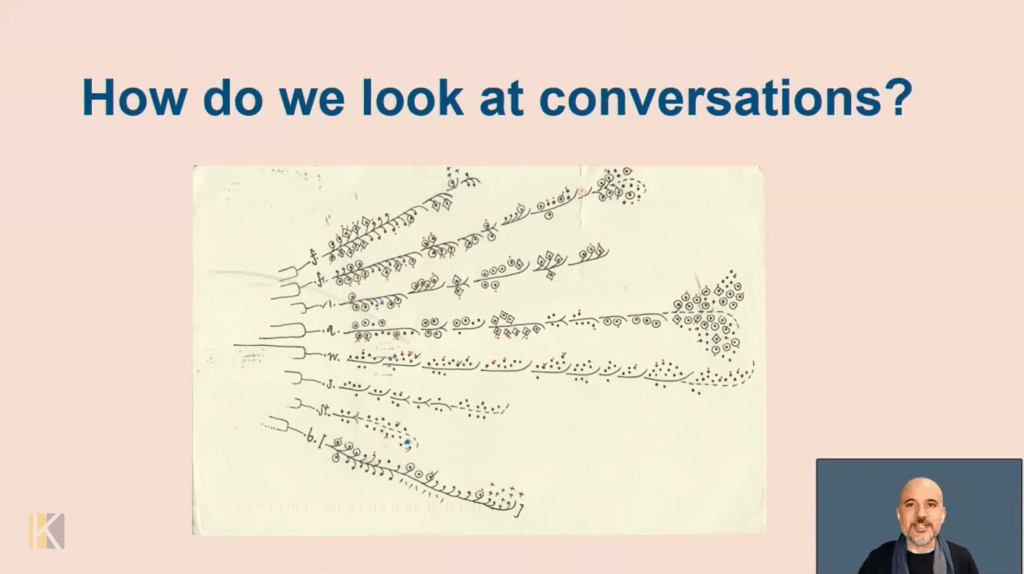
Elena Astilleros
$h*t to Hit!! Creating Meetings Participants Love
Elena Astilleros of Empoderment, discussed turning your meeting from “Sh** to hit.” Facilitators are the ones who bring the magic to the room, she said. Our users can’t go further than where we are at ourselves. Elena taught participants how they might be creating the wrong kind of drama (without realizing it) when facilitating. Elena’s workshop taught participants how to lead lively meetings where they (and everyone participating) feel alive and reinvigorated from their time together. She provided attendees with practices they can start using to trigger group genius in their next meeting or workshop and a simple way to up-level the questions they ask their team.
“Do you feel totally drained after facilitating your sessions? When you ask questions, do you get crickets…or worse, only the same handful of people answering every time?”


Rachel Ben Hamou & Andre Ben Hamou
Onboarding Without Hoarding
Rachel Ben Hamou, Director of Talent Development at PeopleStorming, and Andre Ben Hamou, Co-Founder of PeopleStorming, explored how to develop processes and criteria (that they will genuinely use) that allow facilitators to evaluate exercises and activities at speed. They taught participants how to ‘Yes And’ the great resources they discover, without things becoming unmanageable. By using play and creating a toolkit, we can embrace both the face-to-face interactions as well as creating a space that also includes our virtual interactions as well.
“Since everything has gone virtual, the internet is a treasure trove AND a landfill of every process and exercise humans can imagine. How do you sift through all that noise to find activities that will help YOU facilitate well?”


The final day was wrapped with a raffle prize giveaway and a celebratory happy hour.
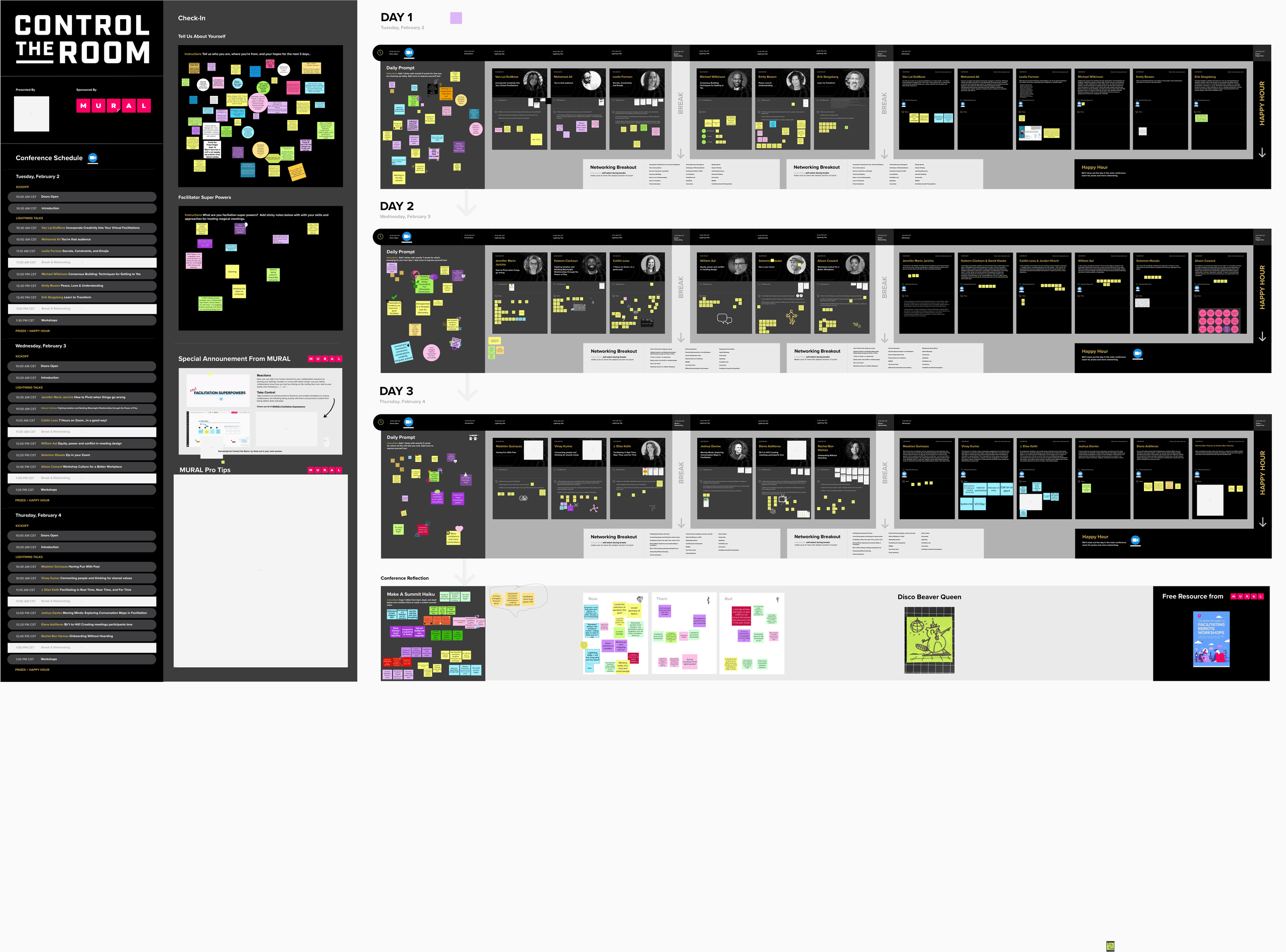
We’re already excited about next year’s summit. To be a part of our facilitator community in the meantime, join us for our weekly Facilitation Lab and check out our upcoming events.



